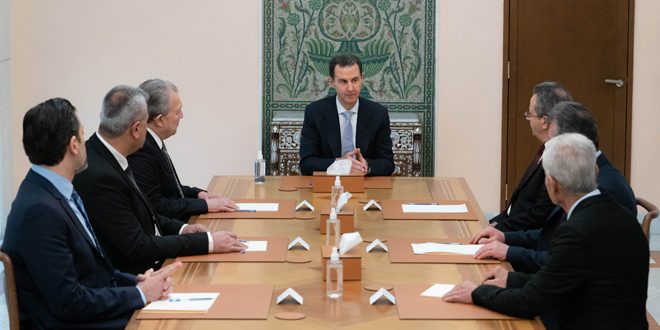President Bashar Al-Assad on Saturday held a meeting with the newly appointed ministers after they took the constitutional oath before President in the presence of Prime Minister Hussein Arnous.
Any change within the cabinet is a means to upgrade the performance and work of the ministries and institutions, President Al-Assad said, pointing out that the change has nothing to do with the persons, but with the persons’ ability to make an addition to their ministries or institutions according to the existing situation and also with their ability to build the work system that enhances their role and creates dynamic performance by the institution.
“Ministerial work is embodied in the ability to achieve some sort of harmony between the capabilities and the existing situation on the one hand and the ideas and policies on the other,” President Al-Assad added.
“This requires a just and logical management of resources in order to guarantee benefiting from these resources in the best way and to invest in the available opportunities effectively through specifying priorities of work,” President Al-Assad pointed out, clarifying that the policies of any ministry should go in harmony with the government policies.
“It is not enough for an official to be honest, he must be able to fight corruption within its ministry or institution,” President Al-Assad said, clarifying that “the success of the government is measured by the extent of justice it achieves.”
On March 29, President Al-Assad issued decree no. 91 for the year 2023 providing for replacing five ministers.
The decree stipulated for appointing Firas Hassan Qaddour as Minister of Oil and Mineral Resources, Mohsen Abdul Karim Ali as Minister of Internal Trade and Consumer Protection, Abdul Qader Jokhadar as Minister of Industry, Louai Emad El-Din Al-Munajjid as Minister of Social Affairs and Labor and Ahmed Boustaji as State Minister.
Hamda Mustafa

